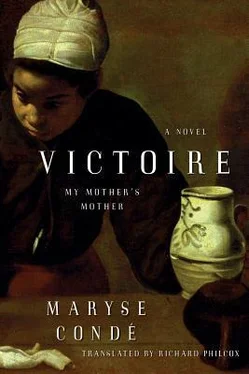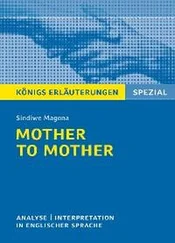Alas! Bobette was giving birth to her twelfth child.
You would have expected it to be a mere formality, to go off without a hitch, as the saying goes. Far from it. The poor woman was losing pints of blood and screaming like an animal in agony. Some matronly neighbors were busy carrying scarlet-stained sheets and calabashes of water. The following morning Elie was a widower, father of Eliacin, the fifth son, a pale crybaby of a boy who never got over the death of his mother. Elie suffered a lot. In his own reserved way, he had adored his Bobette. It’s true she was no longer very lovely. It’s true she had become fat, enormous even, from giving birth, and from eating breadfruit, dombwé dumplings, and thick soup. Even so, she had meant a lot to him.
The next morning, they were getting ready for the wake ceremony when a tilbury jolted into the sunken lane. A young woman got out. Blonde, perfumed, dressed like a princess out of a fairy tale, it was Anne-Marie Walberg. You can imagine the effect this visit had on the wretched surroundings. People gaped in embarrassment.
It is obvious that Anne-Marie and Victoire, who were at an age for conspiring and scheming in secret, had agreed to meet up at Goyave. The former had assured the latter that, newly wedded to a man of prominence, she was in a position to help her. There remained, however, a number of questions concerning this shocking behavior. Out of respect for her uncle’s mourning, couldn’t Victoire have postponed her plans? No way. The two accomplices did their whispering on the doorstep. Then Anne-Marie went and kneeled at the side of the deceased, laid out on her bed, and squeezed into her best dress. In the meantime, Victoire gathered up her old clothes and cradled Jeanne in her arms. At first nobody could understand what was going on. Their eyes were opened when both women climbed into the tilbury. The concert of “Oh, Good Lord!” alerted Lourdes, who came out with the foreboding of misfortune. On seeing her, Victoire sat the child on her lap and made her wave with one of her tiny hands.
That was how Jeanne said farewell to her origins of Marie-Galante.
She was never to return to her native island. She was never to know any member of her mother’s family. Her mother never described to her La Treille or Grand Bourg and she never spoke to us, her children, about it. Is that why Marie-Galante in my imagination signifies a mythical land, a lost paradise waiting to be repossessed? I had lost my placenta there, buried under a tree I could no longer find. Elie was often tempted to force his way into the Walbergs’ home. But feelings about distance were different then. La Pointe, which is situated at a mere twenty or so kilometers from Goyave, seemed to be on the other side of the world. Elie got the impression it could only be reached after a voyage as long and perilous as that taken by Christopher Columbus’s caravels, the Niña and the Pinta .
He renounced such an undertaking. I know that later on one of his sons managed to draw closer to Jeanne. Occasionally, he would turn up at mealtimes. He was the only one who forced open the barriers erected by our family.
MORE THAN TWENTY years after the event, Lourdes, who had settled down in Goyave, married a fisherman and produced ten children, still lamented:
“Victoire, she was my little sister. Sésé an mwen. Her child, she was my child. Ti moun an mwen. It’s as if she came out of my womb. When she turned her back on us like that, I wanted to die. And then I understood. What she wanted for her child was an upstairs-downstairs house made of concrete and wood. Behind it, a hurricane shelter. In the bedroom, a four-poster bed and a stool to climb up into it. That’s what she wanted and that’s what she got. But you don’t trample on the hearts of one’s family for all that nonsense. Just for that. It might be all right to insult the living. But you should never disrespect the dead! Can you imagine! Bobette was lying on the other side of the wall. Victoire left without even kneeling to whisper a good-bye. I’ll say it again, you don’t disrespect the dead. Otherwise they take their revenge and their revenge is terrible. You can’t escape it, even if you run in every direction like a rat smoked out from a cane field. That’s why, I’m pretty sure, she never knew a single day of happiness. You can’t have a wicked heart and be happy.”
Elie was more temperate, even though Victoire’s behavior had sickened him, he whose feelings had already been so hurt. On that day he had lost not only his wife, but through Victoire and Jeanne all that remained of his beloved twin sister, Eliette. Stoical, he shook his head:
“Life is an Arab stallion. It throws us to the ground one after the other. If the cane doesn’t kill you, something else will. Wicked heart? No, I don’t think Victoire had a wicked heart. She simply was looking for a better life for her child and that’s what we all want. Isn’t that right?”
In this discussion I will try and excuse Victoire. Anne-Marie promised to come to her aid by procuring her a job as a cook. Not only was it a way of rescuing her, but also of ensuring a roof for her child. But Anne-Marie had no use for Victoire’s ragtag relations of field Negroes, country bookies, and boo-boos. She didn’t want them on her floor. Victoire, who was in no position to protest, had to accept her conditions. I have to admit too that Caldonia’s death, Dernier’s desertion, and all the vile deeds of Marie-Galante had hardened her heart. She had loved her grandmother so much that, deprived of her warmth, she withdrew into herself. As for the island that had treated her so badly, she returned the compliment.
AROUND 1892 LA Pointe, “the yellow city,” numbered a little under twenty thousand souls. Prosperous in spite of her incredible filth, she had been the prime victim of natural catastrophes. We may recall that after the February 1843 earthquake, rear admiral Gourbeyre, then governor of Guadeloupe, addressed the following dramatic message to his ministry in charge: “At the moment I am writing to you I have learned that La Pointe no longer exists.”
He was mistaken; La Pointe was born again like a phoenix from its ashes. But it was still not out of the woods. In September 1865 a powerful hurricane devastated it once again. Six years later a fire destroyed it entirely. As a consequence Boniface Walberg, heir in 1889 to his uncle Ludovic, who had returned to France given the difficulties of the sugar industry, reinforced with masonry the house on the rue de Nassau, a little outside the center on the western outskirts of town. He even went so far as to cast a concrete slab on the roof, which had the annoying habit of flying off at the slightest blow of wind, and then cover it with slate tiles. His house was now a replica of his store, whose facade stretched twenty meters along the quai Lardenoy, adjacent to the businessmen’s club where they held the most magnificent of balls. The house on the rue Nassau had one particular feature: a secret garden at the back, hidden from prying eyes, like certain houses in London. Behind the kitchen and the washhouse there were almost a thousand meters of lawn where a large-leafed licuala and two blue palm trees grew. Anastasie, Uncle Ludovic’s wife, had planted some pomegranate trees with bright red flowers.
We note that the name of Boniface Walberg was listed in the General Business Almanac , which included the names of the most important merchants. His employees, whom he treated with a rare correctness at a time of inequality, had invented the half-affectionate, half-mocking nickname of Bèf pòtoriko because he was short-legged, thickset, with a forehead hidden under a fringe of hair as black as the coat of a bull from Puerto Rico. They credited him also with a member that would not have been out of place on such a creature. If you believed the gossip, the dames-gabrielle from a bordello on the Morne à Cayes, which he frequented regularly before his affair with Victoire, avoided him, fearful of his iron rod. Underneath this appearance he was in fact someone unsure of himself, timorous, even fainthearted. He had let himself be hoodwinked into marrying Anne-Marie Dulieu-Beaufort, who had brought him as a dowry nothing more than a violin, not even a Stradivarius, a mundane instrument purchased for a few francs at an instrument maker’s in La Pointe. Authoritarian, and a head taller than he, she intimidated him to such a degree that he made love to her only on the fifth night of their marriage. It had been a fiasco. Ever since, he had been such a rare visitor to her bed that when in exasperation she announced she was pregnant, he was close to thinking it was another machination of the Holy Ghost.
Читать дальше












